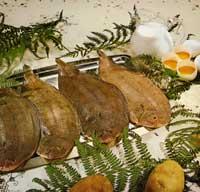Endemic cattle in the Autonomous Community of the Basque Country
The insufficiency of the food iodine can have serious consequences in all ages: endemic goiter, proliferation of abortions, increased neonatal mortality, congenital alterations, neurological errors and alterations of mental functions, delay in the physical development of children and adolescents, etc. This set of effects is called “Iodine insufficiency disorders” (IGA).
The consequences of these effects constitute a serious problem of Public Health worldwide. This risk affects more than one billion people in Asia, Africa and South America. Although the so-called GIGAS have disappeared in North America, some European states still have major problems such as Austria, Germany, Spain, France, Greece, Italy, Portugal, Romania and Turkey. In Spain, the endemic goiter has been located at: Andalusia, Aragon, Asturias, Canary Islands, Castile, Catalonia, Galicia, Murcia and Basque Country.

Iodine insufficiency in developed states is usually mild, and not all of the aforementioned effects appear, but reproduction of the mouths. Due to the goose, many people go to the doctor and it means a great economic expense for society.
Prevention of IGA is not so difficult if several measures are taken to take sufficient iodine in meals: iodated salt, iodate oil, iodate bread or iodate water. These measures are economic and the most used is that of iodated salt, since this matter is consumed by most people (a similar amount every day) and is easy to distribute in the marketing circuits in developed countries.
Iodine needs vary based on age and while newborns need 40-90 g/day, pregnant women need 200 mg/day and people who are in other circumstances have between these two limits. The most abundant iodine in food is found in iodate salts and in seafood (fish and seafood). Iodate salt is marketed since 1982 and it is convenient that, with some exceptions, we all take this type of salt, especially in the case of pregnant women.
The lack of iodine is the most frequent cause of the formation of nodular goiter, which causes in most cases the appearance of hyperthyroidism in populations such as ours. If we remove the endemic goiter, hyperthyroidism problems are significantly reduced. Patients with multinodular goiter or Graves-Basedow disease should not be included in iodoprophylaxis measures for their negative consequences.
Data of the Autonomous Community of the Basque Country
In a work carried out in the seventies it was observed that in the Autonomous Community of the Basque Country 15% of the inhabitants of the rural areas had goose, but no measures were taken against them. The work we are now dealing with analyzes the results of an epidemiological study carried out in the Autonomous Community of the Basque Country between 1988 and 1992 between 4,336 children from 6 to 14 years old. Three areas were taken into account: the urban, the Atlantic and the Mediterranean. 60 public schools, 24 private schools and 24 ikastolas.
The results show that the goose was more frequent in the girls than in the boys (27.6% and 21.2% respectively), in the rural areas ahead of the cities (33.4% and 20.3% respectively) and in the interiors above the coastal areas (32.8% and 17.2% respectively). In the maritime zone, in addition, it was more frequent in zones without coasts.

The prevalence of goiter increases with age, especially in those older than 10 years. Only 5 schooled children detected nodules in the thyroid. The average weight and height of the students were similar among those who had goose and did not.
Taking into account that in a geographical area more than 10% of children between 6 and 12 years of age have a vote speak of the endemic goiter, in this study it is shown that the goiter is endemic throughout the Basque Country Community, except in the region of Donostia-Bidasoa Behea. According to the criteria of the World Health Organization (WHO) is of level I of gravity, which means a high prevalence of goiter. We do not know if this situation ensures normal mental development.
Although iodated salt as mentioned above has been marketed since 1982, the results of this study show a low consumption in our environment. The Department of Health of the Basque Government has launched a program to prevent and control problems arising from iodine insufficiency to eradicate the endemic goiter among schoolchildren for the year 2000 and for 95% of the population that can take salt iodate. We hope that we all have good results.





